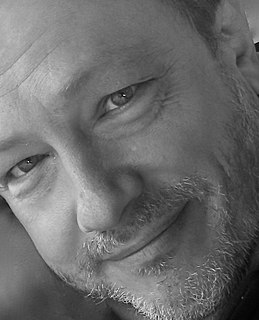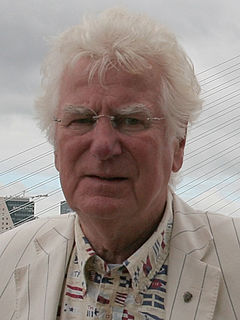Top 79 Thematic Quotes & Sayings - Page 2
Explore popular Thematic quotes.
Last updated on November 24, 2024.
My being Indian is possibly the biggest thing that influences my stories. Not just in terms of settings - most of the settings in my stories are Indian - but also in terms of characters and plot. I think growing up in India grew my imagination in certain ways that would not have happened in any other place. I'm also fascinated by the idea of India, and writing stories allows me to explore this. As for thematic elements, they are probably pretty obvious in my stories. I also hope that my stories bust stereotypes at least to a modest extent.
I don't pay much attention to how the plays relate thematically to each other. I think that's very dangerous to do, because in the theater one is self-conscious enough without planning ahead or wondering about the thematic relation from one play to the next. One hopes that one is developing, and writing interestingly, and that's where it should end, I think.
I really like the interplay between thinking of text as ephemeral and thinking of it as a concrete, physical thing. With almost anything that I write, I'll stay completely immersed in the electronic text of it for a period of time and in another period, I'll stay immersed in it as a physical thing that can cut your skin. So with the apocalypses, I had them taped all over the wall and they had codes on them. Sometimes I would color code them in terms of thematic elements, sometimes in terms of voice, sometimes visual forms or images.
London' is a gallery of sensation of impressions. It is a history of London in a thematic rather than a chronological sense with chapters of the history of smells, the history of silence, and the history of light. I have described the book as a labyrinth, and in that sense in complements my description of London itself.
I can't trace thematic similarities between Then We Came To The End and The Unnamed to a life event; I think it's more just a natural progression as a writer. Everything changes in the second book - tonally, character-wise, situationally - and on top of that, I think I wanted a challenge. I wanted to see if I could do it.
I've been doing photography in one form or another for, oh golly, over seventy years. I don't carry cameras. I used to. For many years I carried cameras wherever I went. Photograph whatever I saw that was of interest. In the last years, I've only used cameras to explore thematic ideas which presented themselves first. And then bring out the cameras to try to explore that idea.
I don't choose something unless I think I have a personal understanding and something I can offer. It's not always thematic. I wanted to do 'The Grinch' because I wanted to direct Jim Carrey creating that kind of comic fantasy character live. I just thought that would be a mind-blowing experience, and it creatively was.
Making photos is helpful of course to master the craft. To get comfortable with the camera. Learn what a camera can do and how to use the camera successfully. Doing exercises for example if you try to find out things that the camera can do that the eye cannot do. So that you have a tool that will do what you need to be done. But then once you have mastered the craft the most important thing is to determine why you want to shoot pictures and what you want to shoot pictures of. That's where the thematic issue comes to life.
To me, feminism in literature deals with the female characters being in some way central to the thematic concerns of the book, or that they are agents of change to some degree. In other words, the lens is focused deeply and intensely on the female characters and doesn't waver, which allows for a glimpse into the rich inner lives of the characters.
The presidents varied in the degree to which they cited the founders. Some, like JFK, LBJ, [Richard] Nixon, and [Bill] Clinton, cited them somewhat frequently, in the range of 100 to 200 times, though, regrettably, not in a thematic or notably profound or even interesting way. Others, like Gerald Ford and Jimmy Carter, cited them rarely.
The way you challenge Superman is by having things happen very, very quickly in different places and then asking, 'Who does he save first? What powers must he use to save each person or stop each disaster?' That's one of the ways you make him interesting beyond the thematic and moral issues that make Superman.
I mean, what's thematic? How to put it? Going back to, like, 1980, when I started writing poetry. Language itself became an issue. I'd even think about font as an aspect of text, you know, how something looks on a page. A lot of this is the product of a very solitary existence, it's like, language, I mean, you know. A lot of time spent alone in the creation of all of this stuff.
From [Nikolai] Medtner himself, who I do not think was the best possible advocate of his own works. But that's my opinion: I find him a little uninteresting and cold, sometimes. Also, at first, the thematic material is not of a kind that makes the greatest appeal, but if you keep with Medtner, I think he will take hold of you, and you're very likely to become a fan.
My work is really the accumulation of these different moods that I've had throughout my life and where they've taken me. I start looking back, and I think, I've actually created a life out of all this, out of these changes of mood. They've pushed me through all these years, and I seem to have a semblance of a life, and if I look very carefully, I can see some thematic design to it. There's some continuity.
I come from a musical family. Mom was a piano teacher for a large portion of her life, and Dad is a saxophone hobbyist who grew up in England during the heyday of Tubby Hayes and Ronnie Scott. I started taking piano lessons from my Mom, but it's too easy to slack off with your parent, so she passed me on to a friend of hers, where I got more motivated to play music by playing pop hits and TV themes. I did some classical training, but I was always more into the really thematic stuff.
'London' is a gallery of sensation of impressions. It is a history of London in a thematic rather than a chronological sense with chapters of the history of smells, the history of silence, and the history of light. I have described the book as a labyrinth, and in that sense in complements my description of London itself.
When you're talking horror or sci-fi, you're working in a genre that has loosely certain thematic elements, or, you could even call them rules. But rules are there to be broken. I think that young filmmakers should go all the way back to the history of horror, from silent films like "Nosferatu", and through to today's horror films, so they understand the history of horror films and what has been done. Understand that, and then add something new or original.
I really love horror novels, horror films, that are pointing at deeper ideas and thematic meaning. It's a way of thinking about films differently; that's what I think I like the most about it. I love the fact that's it's pointing at a more mysterious world - that the world is more of a mysterious place than we tend to let ourselves believe.
















